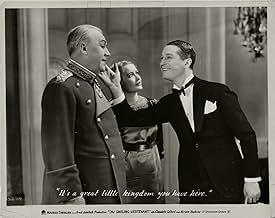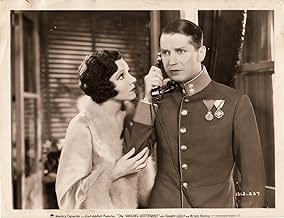AVALIAÇÃO DA IMDb
7,1/10
4,2 mil
SUA AVALIAÇÃO
Adicionar um enredo no seu idiomaAn amorous lieutenant is forced to marry a socially awkward princess, though he tries to keep his violin-playing girlfriend on the side.An amorous lieutenant is forced to marry a socially awkward princess, though he tries to keep his violin-playing girlfriend on the side.An amorous lieutenant is forced to marry a socially awkward princess, though he tries to keep his violin-playing girlfriend on the side.
- Indicado a 1 Oscar
- 1 indicação no total
Charles Ruggles
- Max
- (as Charlie Ruggles)
Maude Allen
- Lady in Waiting
- (não creditado)
Granville Bates
- Bill Collector
- (não creditado)
Harry C. Bradley
- Count Von Halden
- (não creditado)
Carrie Daumery
- Lady in Waiting
- (não creditado)
Ludwig Heinsich
- Man
- (não creditado)
Cornelius MacSunday
- Emperor Franz Josef
- (não creditado)
Elizabeth Patterson
- Baroness von Schwedel
- (não creditado)
Janet Reade
- Lily
- (não creditado)
Werner Saxtorph
- Joseph
- (não creditado)
Karl Stall
- Master of Ceremonies
- (não creditado)
Robert Strange
- Col. Rockoff
- (não creditado)
Charles Wagenheim
- Arresting Officer
- (não creditado)
Enredo
Você sabia?
- CuriosidadesA French version with dialogue and lyrics by Henri Bataille was shown in New York on 15 October 1931 and was also a big hit in Paris. It had the same three leading actors and was filmed at the same time as the English language version, as dubbing had not yet been invented.
- Erros de gravaçãoThe unpaid bill demands only 1614,25 crowns, even though the sum adds up to 1855,25 crowns.
- Versões alternativasA version in French with dialogue and lyrics by 'Henri Bataille (II)' played in New York City, New York, USA on 15 October 1931, and was a big hit in Paris. It probably was a dubbed English version, but slightly shorter at 2,476.80 m in length.
- ConexõesFeatured in The House That Shadows Built (1931)
- Trilhas sonorasToujours l'Amour in the Army
(1931) (uncredited)
Music by Oscar Straus
Lyrics by Clifford Grey
Sung by Maurice Chevalier twice
Avaliação em destaque
Ernst Lubitsch came to Hollywood in the years before the "Code", or censure, if you will, that plagued all artists working during that era. This is a clear example of what could be done in the movies when the scissors of the censor were not in the picture, no pun intended.
If you haven't seen the film, please stop reading now.
This film is based in an operetta. It's light, it's frothy, it's naughty, and it's a delight to watch it more than sixty years after it was made. Mr. Lubitsch was a genius in creating films that bore his signature like no other director of the time. His European background is constantly in display. He had a sensitivity for giving the viewer a glimpse of that old world he had left behind when he emigrated to America.
Mr. Lubitsch worked with the best actors of the times. His choice of Maurice Chevalier, or maybe it wasn't his decision, but the studio's, pays handsomely in this movie. Mr. Chevalier brought his own style to the American cinema and he can be a bit strange in the way he reacts in front of a camera, but in spite of his school of acting, he went to become a favorite in this country too.
Mr. Chevalier plays the bon vivant lieutenant in the Austrian army who has a roving eye for any beautiful woman that crosses his path. He finds that, and much more with Franzi, the violinist in charge of an all women's orchestra. It's clear what attracted Niki to Franzi; she is a beauty who aims to please. There is no subterfuge in the relationship; Franzi moves right in into Niki's apartment. This couldn't have been done in the movies later on, when the Hays code came into being.
Claudette Colbert had a lot of charisma. In "The Smiling Lieutenant" she shows why she was a star in her own right. Ms. Colbert and Mr. Chevalier made these lovers look right. Nothing is done in the open and everything is done with great taste, although the viewer can guess what's really happening without too much guessing.
To complicate matters, our lieutenant is fancied by a dowdy Princess Anna on a visit to Vienna. Since honor is at stake, Niki marries her, but his heart is left behind with Franzi. Niki doesn't want any part of this woman who has been imposed on him.
When Franzi and the orchestra make an appearance in the neighboring country, Niki discovers her and they go back to their trysts whenever they find the time, to the chagrin of the princess. Franzi realizing she could never get Niki without causing a great scandal, gives in, and in the process, transforms the "ugly duckling princess" into a lovely swan. Miriam Hopkins playing Anna ends up with the man she wanted. The final scenes suggest that yes, they will have their fun after all.
The set decorations of the film are breathtaking. The palace scenes, the costumes, take the viewer to the Austro-Hungarian empire. This film will please anyone looking for an easy time at the movies thanks to Ernst Lubitsch.
If you haven't seen the film, please stop reading now.
This film is based in an operetta. It's light, it's frothy, it's naughty, and it's a delight to watch it more than sixty years after it was made. Mr. Lubitsch was a genius in creating films that bore his signature like no other director of the time. His European background is constantly in display. He had a sensitivity for giving the viewer a glimpse of that old world he had left behind when he emigrated to America.
Mr. Lubitsch worked with the best actors of the times. His choice of Maurice Chevalier, or maybe it wasn't his decision, but the studio's, pays handsomely in this movie. Mr. Chevalier brought his own style to the American cinema and he can be a bit strange in the way he reacts in front of a camera, but in spite of his school of acting, he went to become a favorite in this country too.
Mr. Chevalier plays the bon vivant lieutenant in the Austrian army who has a roving eye for any beautiful woman that crosses his path. He finds that, and much more with Franzi, the violinist in charge of an all women's orchestra. It's clear what attracted Niki to Franzi; she is a beauty who aims to please. There is no subterfuge in the relationship; Franzi moves right in into Niki's apartment. This couldn't have been done in the movies later on, when the Hays code came into being.
Claudette Colbert had a lot of charisma. In "The Smiling Lieutenant" she shows why she was a star in her own right. Ms. Colbert and Mr. Chevalier made these lovers look right. Nothing is done in the open and everything is done with great taste, although the viewer can guess what's really happening without too much guessing.
To complicate matters, our lieutenant is fancied by a dowdy Princess Anna on a visit to Vienna. Since honor is at stake, Niki marries her, but his heart is left behind with Franzi. Niki doesn't want any part of this woman who has been imposed on him.
When Franzi and the orchestra make an appearance in the neighboring country, Niki discovers her and they go back to their trysts whenever they find the time, to the chagrin of the princess. Franzi realizing she could never get Niki without causing a great scandal, gives in, and in the process, transforms the "ugly duckling princess" into a lovely swan. Miriam Hopkins playing Anna ends up with the man she wanted. The final scenes suggest that yes, they will have their fun after all.
The set decorations of the film are breathtaking. The palace scenes, the costumes, take the viewer to the Austro-Hungarian empire. This film will please anyone looking for an easy time at the movies thanks to Ernst Lubitsch.
- jotix100
- 26 de dez. de 2004
- Link permanente
Principais escolhas
Faça login para avaliar e ver a lista de recomendações personalizadas
- How long is The Smiling Lieutenant?Fornecido pela Alexa
Detalhes
- Data de lançamento
- País de origem
- Idiomas
- Também conhecido como
- The Smiling Lieutenant
- Locações de filme
- Empresa de produção
- Consulte mais créditos da empresa na IMDbPro
- Tempo de duração1 hora 33 minutos
- Cor
- Proporção
- 1.20 : 1
Contribua para esta página
Sugerir uma alteração ou adicionar conteúdo ausente


































